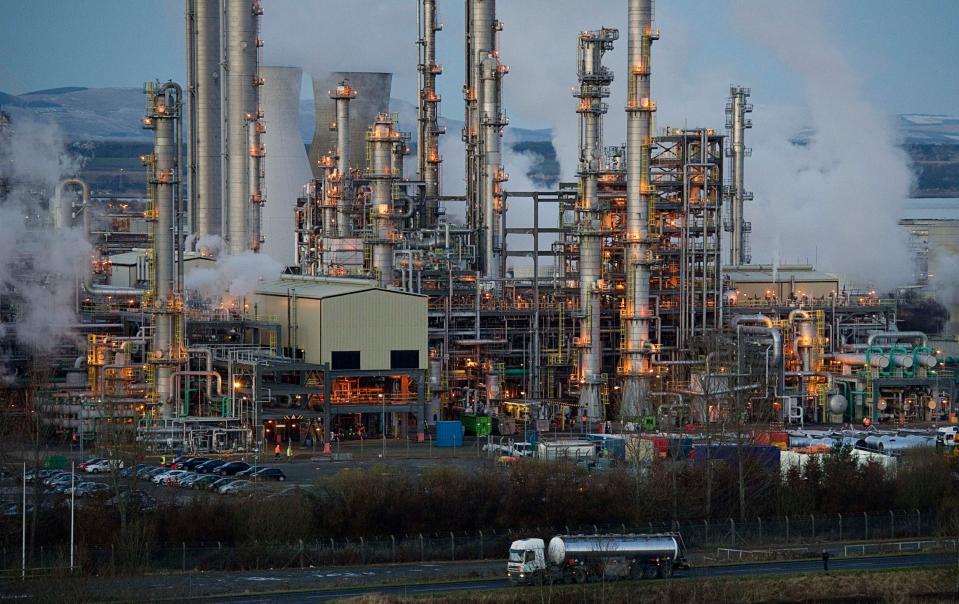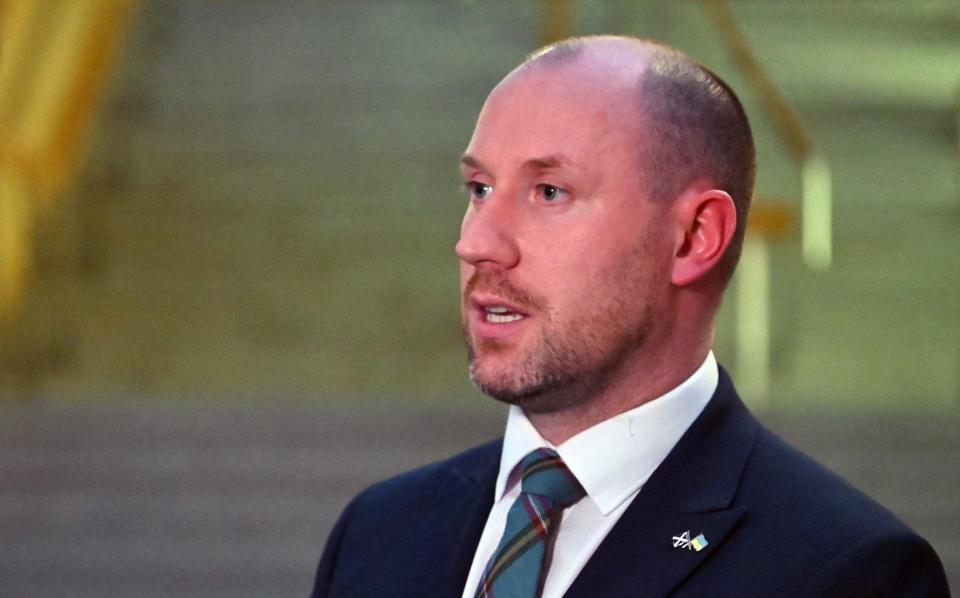How Sir Jim Ratcliffe has dealt a hammer blow to the SNP at Grangemouth

The owner of Scotland’s last remaining oil refinery Grangemouth has lost more than £1bn over the last 12 years, although its looming closure combined with mounting technical problems could cause further financial pain.
Analysts say the refinery’s “hydrocracker” unit, which rakes in cash from producing diesel, went offline in April and has not been working since.
It is understood that the cost of repairing the unit has contributed to Grangemouth’s anticipated closure.
The 100-year-old refinery is expected to halt operations in spring 2025, transforming into a fuel import terminal with the loss of several hundred jobs and potentially thousands more among suppliers and contractors.
Some roles could be axed as early as next year, unions say, as the refinery’s owner Petroineos has notified workers that maintenance operations will be scaled back.
Officially, nothing is yet certain, as highlighted by Franck Demay, chief executive officer at Petroineos Refining.
Last week he said: “This does not change anything for our operation today, where it is business-as-usual at the Grangemouth refinery. As the energy transition gathers pace, this is a necessary step in adapting our business to reflect the decline in demand for the type of fuels we produce.
“As a prudent operator, we must plan accordingly, but the precise timeline for implementing any change has yet to be determined.”

However, there is no hiding from the fact that Grangemouth has lost £1bn since 2011, raising questions over the viability of its economic future.
The loss of the refinery will serve as a significant blow to nearby towns, such as Grangemouth, although the knock-on effects will be felt throughout Scotland.
Grangemouth supplies almost all the petrol and diesel that keeps Scotland’s motorists on the road, as well as the oil that heats hundreds of thousands of homes without gas. Many industries rely on it too.
As such, Grangemouth’s potential closure has led to the Scottish government organising talks with Petroineos, a 50:50 joint venture between Sir Jim Ratcliffe’s Ineos conglomerate, and PetroChina, a Chinese state-owned oil company.
Neil Gray, Scotland’s Energy Secretary has said he will explore every opportunity to extend the life of the refinery and has already written to UK Energy Security Secretary Claire Coutinho asking for a meeting in “very short order”.
He said: “I’m looking to collaborate not just with colleagues across the Parliament but also with those in the UK government to make sure that we are looking at every possible opportunity for extending the life of the refinery, and ensure a continued industrial operation at the wider Grangemouth site as well.”
Mr Gray is already under political pressure from his own SNP colleagues as well as Scottish conservatives.

Michelle Thomson, the Scottish parliament member for Falkirk East, which covers Grangemouth, said the closure would be a disaster for local people. She has raised an urgent question in the Scottish parliament and is talking to local unions.
She said: “The Scottish government must support those individuals and families whose livelihoods are under immediate threat. But governments need to undertake an urgent and thorough analysis of the wider impact, not least to both downstream and upstream supply chains.”
The Grangemouth site accounts for about 4pc of Scottish GDP, employing about 2,000 people directly across three different businesses, plus up to 7,000 contractors.
Analysts say, however, that the sheer costs make keeping Grangemouth’s refinery in business unrealistic – especially with its most profitable hydrocracker unit no longer in action.
Alan Gelder, vice-president and lead analyst for refined products at Wood Mackenzie, said production has been compromised by breakdowns.
“At the start of the year we did our [regular] analysis on closure risk, and didn’t see a high risk of closure in the near term,” he says. “But in April, the hydrocracker unit which produces a lot of diesel went offline and hasn’t come back.
“That hits the profitability of the refinery very hard. Global refining profit margins are expected to weaken next year so they might well have doubts about how much money they need to spend and how effective that would be. So all those things have come together for them to say, actually, let’s just stop processing crude and convert it into an import terminal.”

Oil traders say Grangemouth’s future has long been uncertain even before it was hit by technical problems.
Greg Newman, chief executive of Onyx Capital Group, which trades 25 billion barrels of oil a year, said: “Grangemouth is quite small and quite old by global standards. This is a problem for all the refineries across the UK and Europe and we are likely to see more closures in coming years.
“The UK now just has five refineries left, so this is going to make the UK very vulnerable to future global shortages.”
For Scottish and UK politicians, however, the even bigger worry is the fate of the other Grangemouth businesses. The site is home to a petrochemical and plastics plant run by another Ratcliffe subsidiary, Ineos Olefins and Polymers.
The company’s raw plastics and polymers go into UK products ranging from construction materials to clothing – and it too is in trouble, reporting losses of nearly £300m in 2022 due to high energy costs.
When asked about the plant’s future, an Ineos spokesman said: “All European petrochemical companies are struggling at the moment with high energy costs relative to our international competitors.
“UK gas and electricity prices are around five times than in the US.”
Political uncertainty also dogs the future of Sir Jim’s third Grangemouth subsidiary, Ineos FPS. It controls the Forties Pipeline network, which brings ashore the oil and gas produced from 80 of the UK’s offshore oil and gas fields. Most of those fields are in decline and so would normally be replaced by new wells.
However, plans by Labour to halt all new drilling should it win power mean the Forties pipeline could become unviable within a decade.
Labour’s proposed ban faces powerful opposition from the unions. Derek Thomson, Scottish Secretary of the Unite union, which has sole rights to represent the refinery employees, said: “Sir Keir Starmer announced that a future Labour government would deliver more than 50,000 new direct and indirect jobs in the renewable energy sector in Scotland but we have heard this before.
“We need to ensure that it is possible for the existing onshore and offshore oil and gas workforce to transition into new energy jobs that are actually real and created for our members to transition into. The reality is that this transition will take decades.”
Some say the Scottish government, a coalition of the SNP and the Scottish Greens, is so conflicted over fossil fuels that it is incapable of responding to crises in the oil and gas industry – despite its national importance.
In a recent speech at a New York climate conference, Humza Yousaf, the First Minister, said Scotland was “collectively guilty of catastrophic negligence” by remaining a major oil producer.
He added: “We will transition from being the oil and gas capital of Europe to unleashing our renewable potential and becoming the net zero capital of the world.”
Stephen Kerr, the Conservative Scottish parliament member for Central Scotland, which also covers Grangemouth, said such views left the refinery with little political support: “It’s becoming clear that there are serious questions about the long-term viability of the whole Grangemouth site. As you remove each component so those remaining risk becoming less viable.
“It needs strong political leadership and a rapid response, but this government has a green tail wagging the SNP dog so we will likely get neither.”

 Yahoo Finance
Yahoo Finance 